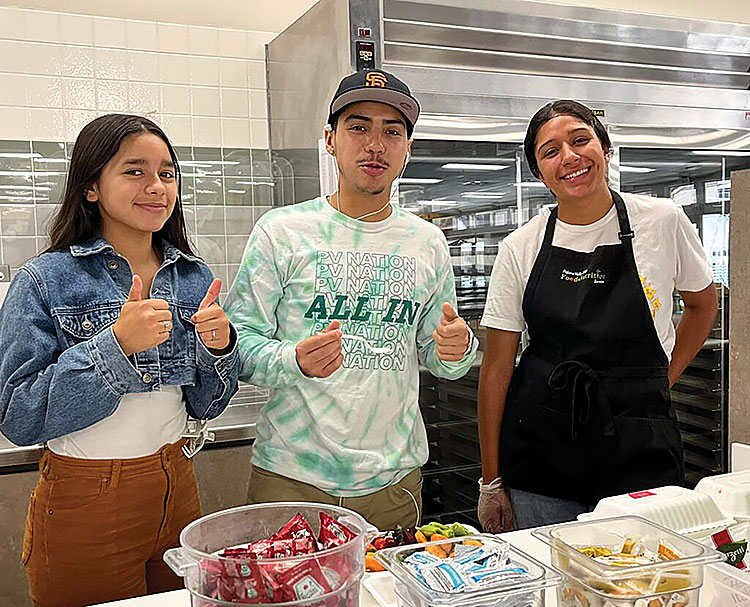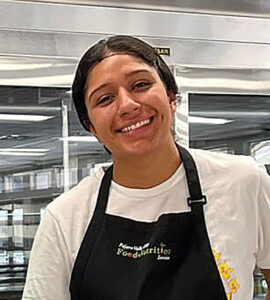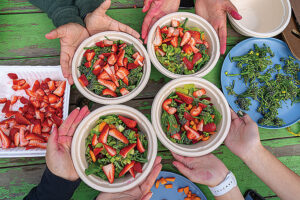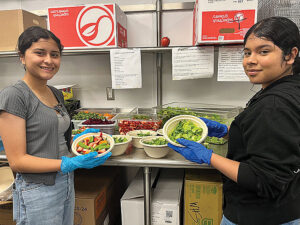Farm 2 Cafeteria is a student-led program that focuses on bringing local organic produce to schools in the form of a salad. It began in August 2021 with field trips to Esperanza Community Farms co-led by Mireya Gomez-Contreras where students planned and designed the program.
During summer 2022, student leaders served more than 400 salads to summer school students at Pajaro Valley High School. Now, students lead in chopping and preparing the salads served to their peers during lunch. Alma Leonor-Sanchez, 19, a recent graduate, is the new manager.
What’s the difference between fruits & vegetables grown organically compared to fruits & vegetables grown conventionally?
Alma Leonor-Sanchez: When fruits and vegetables are grown organically there is more attention and that goes into the health of the soil, the produce, the Earth, and the consumer. Organic produce is grown without pesticides, hormones, and other strong chemicals. Small organic farming places more focus on the well-being of the consumer and the quality of the produce rather than how large a product can be grown, how quickly it can be shipped and sold.
What are the biggest benefits of this program, for the students and for the growers?
Samantha Cruz, Esperanza Farms marketing manager: Yo veo mucha conexión, reconocimiento e identificación por parte de los jóvenes.El enlace que farm 2 cafetería está creando también está rompiendo paradigmas y mostrando como el grower o agricultor es tan valioso como un profesor de matemáticas. El conocimiento agrícola básico desde la formación escolar es motivo para que más jóvenes se profesionalicen para buscar soluciones sustentables que favorezcan el planeta.
I see a lot of connection, recognition and identification on the part of young people. The link that Farm 2 Cafeteria is creating is also breaking harmful paradigms and showing how the grower or farmer is as valuable as a mathematics teacher. Basic agricultural knowledge from school training is a reason for more young people to become professionals and to seek sustainable solutions that benefit the planet.
The program is now entering its 3rd year. How is it financially sustainable?
Mireya Gomez-Contreras: The program was started, thanks to seed money from our beloved community friend Rowland Rebele. His contribution in 2021 to support the students’ idea to eat vegetables from the community farm ¼ mile away has since grown to serve over 200 salads per week to three high schools in Watsonville.
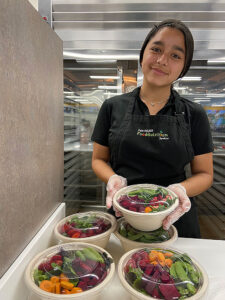 While it’s grown in number of students intern, salads made & consumed and pounds of produce purchased from local small farms, it is still fully subsidized by Esperanza through foundation and government grant funds.
While it’s grown in number of students intern, salads made & consumed and pounds of produce purchased from local small farms, it is still fully subsidized by Esperanza through foundation and government grant funds.
We are working actively to engage Pajaro Valley Unified School District Food and Nutrition Dept. to purchase the produce and slowly begin to integrate it into the school food programs.
This is not as easy as the public might think, given the federal purchasing guidelines, however, federal and state funds are increasing to allow for creativity and expansion in school food procurement processes.
Esperanza is hopeful to work with neighboring districts to implement similar student-led and hands-on projects that will transform local food ways.
Students attend high school for four years, then graduate. How has this influenced post-grad plans of the student leaders? How do ensure you will have new students to take over?
Alma Leonor-Sanchez: Youth leaders have made meaningful connections with members of the community that have impacted how they see their impact.
By seeing themselves as integral members of their community, many take what they learn from their experience with Esperanza and F2C and implement it into their career plans.
We have interns who have graduated high school and are now studying public health, agriculture, and environmentalism. We recruit students with the help of active teachers and partners like Watsonville Wetlands Watch.
There is no shortage of interested students who care about helping schools serve more nutritious local meals.
Is this a program that could be replicated at other high schools? How?
Alma Leonor-Sanchez: This program can and is in the process of being replicated at other local high schools; especially those that reside in farm-working communities such as Salinas.
First and foremost, this project needs students to be interested in health, farming or the environment for it to be replicated. Students play a crucial role in motivating a school culture and creating change.
If students are passionate about something happening at their school, many changes can be made. Besides students taking the forefront, we also need to consider that the current systems in place have made it difficult for programs like F2C to work; but, the systems can be changed.
Sharing this project and experience of organic local farming with key stakeholders such as City Council members, school board members, cafeteria staff members, etc. allows us to actively work towards a better, more just food system that involves everyone.
Incorporating this program into the high school curriculum is a way that we can change the way we engage with organic food and local farming so that students can rebuild a just food system.


